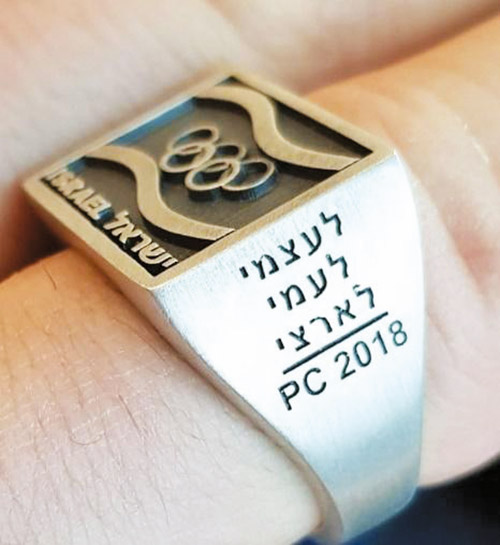


When you combine a Jewish Olympic athlete from Brookline, Massachusetts with an affinity for mechanical engineering and an entrepreneurial spirit with the drive to change the world, you get the one and only AJ Edelman.
Inscribed on Edelman’s 2018 Olympic ring is “לעצמי, לעמי, לארצי” (For myself, for my people, for my country). Edelman’s goal is clear, “If you think you can have a positive impact, for the Jews or Israel, and no one else can or wants you to do it, you have to do it,” he said. Since college, Edelman has acted with the intention of using sports and innovation to improve how Israel and the Jewish people are perceived.
Edelman is aware that as a Jewish representative of Israel, antisemitism is unavoidable. While studying mechanical engineering, Edelman played goalie on MIT’s hockey team where he had his first experience with antisemitism. At the time, Edelman believed the correct response was “Don’t call it out, keep your head down and don’t make waves,” so he let it slide. Edelman again faced antisemitism while competing as Israel’s skeleton sledder at the 2018 Winter Olympics in Pyeongchang, South Korea. Despite wishing he reacted differently in college, he felt he had to again ignore the incident because Edelman didn’t want his antisemitic encounters to negatively color Israel’s Olympic experience or overshadow the accomplishments of Israel’s other Olympic athletes.
These experiences “gave me a good exposure into how Jews usually act when they’re singled out, and how we should instead act,” Edelman explained. He now advocates that if you’re facing antisemitism you need to respect yourself enough to stand up for the wrong done to you. Edelman strongly believes that Judaism should never feel restrictive or embarrassing. Rather, Judaism should be empowering as there is an entire nation and country on your side.
Edelman trained for the 2018 Winter Olympics through trial and error and without a coach by watching endless hours of YouTube videos of his and other athletes’ skeleton races to understand the physics and intricacies of the sport. Knowing he was representing both the Jewish people and Israel inspired Edelman to persevere. With his determination and his nation of cheerleaders, only four months after discovering the sport of skeleton, Edelman qualified as Israel’s skeleton sledder in the 2018 Winter Olympics and finished 28th in the world.
Following the 2018 Winter Olympics, Edelman hung up his sled knowing that the up-and-comer Jared Firestone would be a stronger skeleton sledder than he was. Edleman hoped that the endless effort he put into having Israel’s Olympic Committee recognize skeleton as an approved national sport would ease Firestone’s ability to train and compete. On top of that, to support Firestone, Edelman assisted with his coaching.
In 2019 as a result of funding challenges, Edelman unsuccessfully replaced his skeleton sled with a bobsled. But the desire to create an Israeli bobsled team was reignited when Edelman came across a note from a Korean fan who described how she was inspired by Edleman’s underdog story. It reminded him of the positive worldwide impact Israeli athletes can have, motivating Edelman to work tirelessly to assemble an Israeli bobsled team.
Edelman is incredibly proud of the diverse bobsled team he created with teammates who identify as Jewish, Arab, Druze, and LGBTQ+. The diversity “isn’t the focal point of our team,” Edelman said “but it is hopefully normalizing things.” Edelman hopes to not only only impact Arab-Jewish relations but also LGBTQ+ involvement in sports. He is working to empower people of all backgrounds to participate and be represented in sports. “When you step onto a field, your background and identity should just be an athlete,” Edelman said.
The special shoes needed to properly grip the ice for bobsled and skeleton haven’t been advanced in 15 years, inspiring Edelman, the mechanical engineer, to upgrade them on behalf of Israel. For the past year, he has been innovating and redesigning these unique shoes to improve their effectiveness and lower their cost for his team.
Edelman also uses his uniform to represent Israel and the Jewish people. In the 2018 Winter Olympics, Edelman’s helmet pictured the biblical personality of Samson pulling down the stone pillars. Samson illustrated the strength of the Jewish people and the pillars served as a personal reminder to Edelman that nothing could hold him back.
One of the other obstacles that Edelman has faced is his battle with depression which he has faced since childhood. Following the 2018 Olympics, his depression reached a new level. To assist Edelman with his depression and social anxiety he adopted LuLu, a Japanese Shiba Inu, and became an advocate for mental health, raising the topic whenever speaking with kids. “I want to get to a point where talking about mental health is like talking about having the cold or any other illness,” Edelman said.
About his Olympic experience, Edelman said, “there is no greater honor than putting on your flag at the Olympic games, it is something really to be treasured.” Unfortunately, Edelman’s bobsled team didn’t qualify for this year’s 2022 Beijing Winter Olympics. Lack of funding and limited access to resources prevented them from participating in enough Olympic qualifiers.
Undeterred, Edelman is looking forward to October 2022 when the world’s bobsled rankings will reset and he can pursue his goal of winning Israel her first winter Olympic medal. Until then, Edelman will continue promoting mental health, advocating for Israel and empowering others through sports and innovation.
Danielle Barta grew up in Teaneck, and made aliyah to Jerusalem following her graduation from Rutgers University. She teaches English at colleges in Jerusalem and has been involved in both formal and informal education for a variety of organizations. Danielle believes that important life skills and lessons are often not ones learned in the classroom, but can be learned from team sports.










